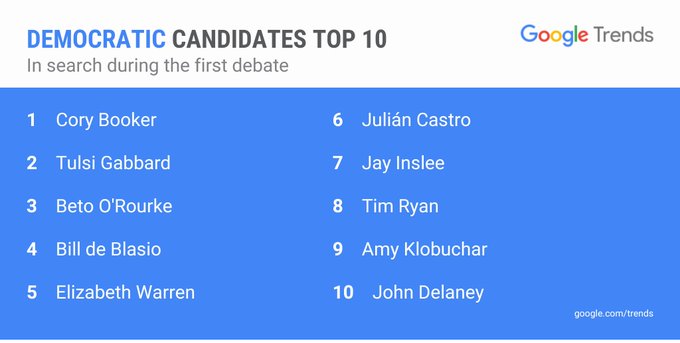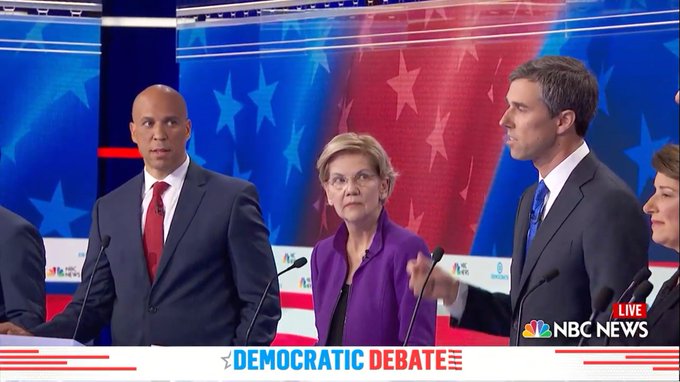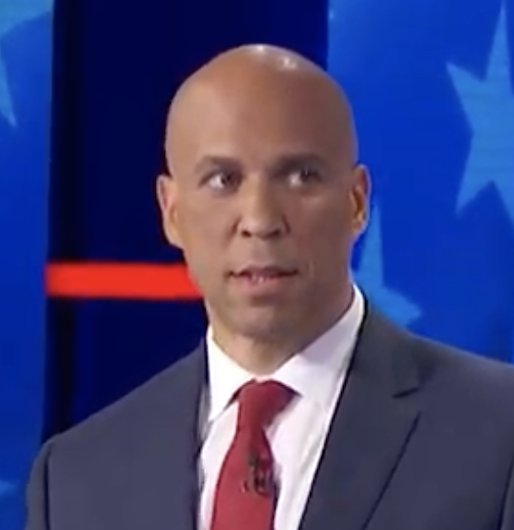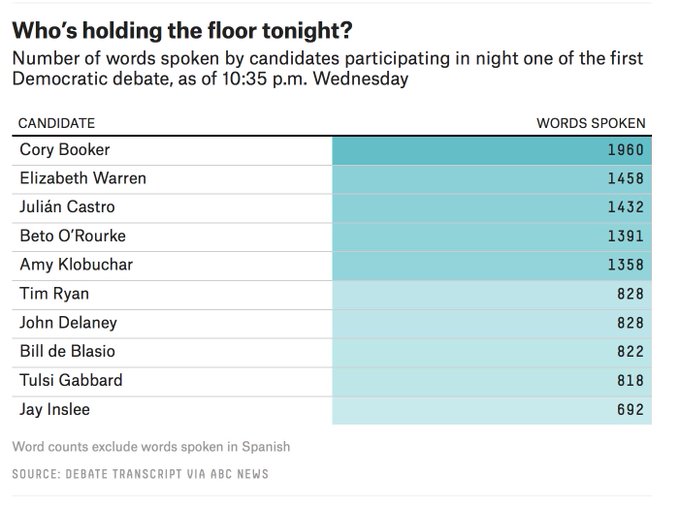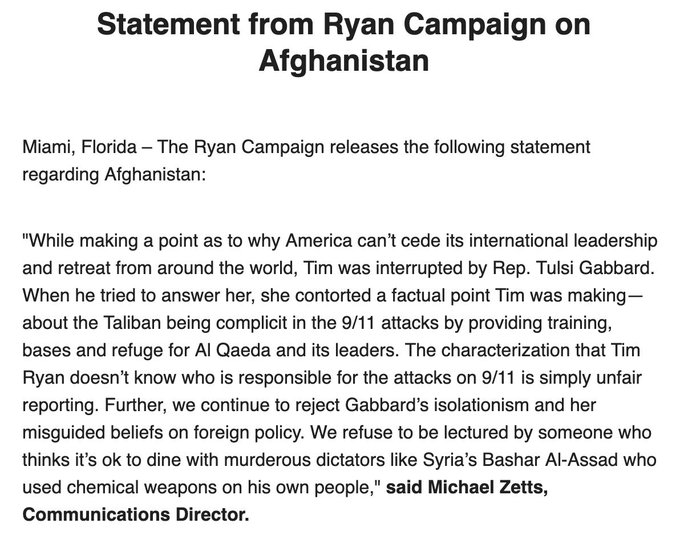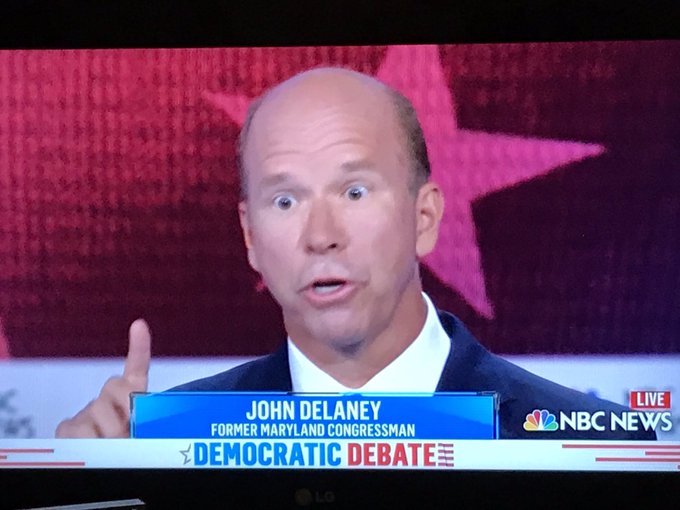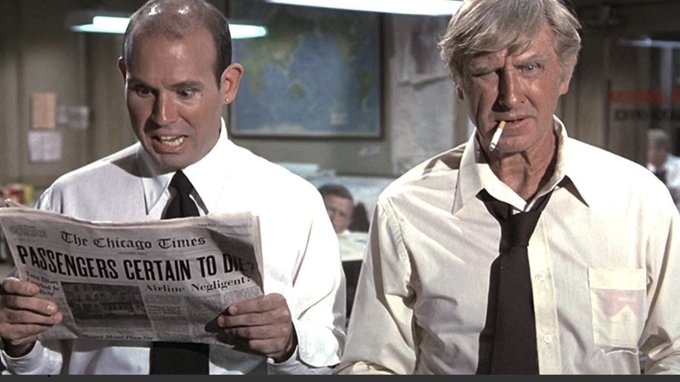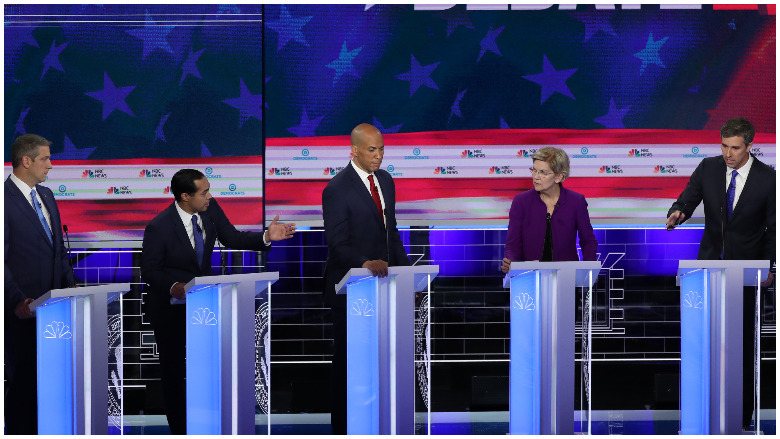
Now that the first half of the first Democratic debate is over, it’s time to pick the winners and losers: Those who were foam, and those who were beer (if you don’t get that reference, you didn’t watch the debate).
First, you have to define the expectations, and those were different for each candidate (as in, Bill De Blasio basically had none). It’s difficult to break through on a primary debate stage with 10 candidates. Furthermore, unlike Thursday’s lineup with Joe Biden and Bernie Sanders in the mix, there was no clear, presumptive frontrunner for the candidates to circle around and attack on Wednesday (although for some reason poor Beto O’Rourke ended up in front of the verbal firing squad more than Elizabeth Warren).
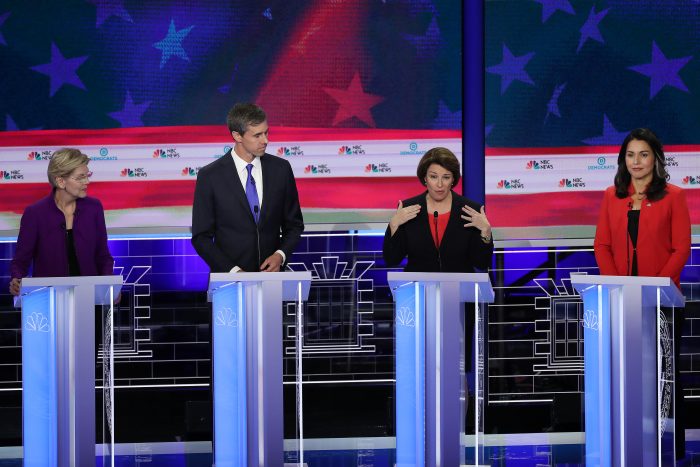
GettySen. Amy Klobuchar speaks as Sen. Elizabeth Warren, former Texas congressman Beto O’Rourke and Rep. Tulsi Gabbard look on during the first night of the Democratic presidential debate on June 26, 2019 in Miami, Florida.
People leading in the polls, like Biden, have a lot more to lose from a nationally televised primary debate; if you’re positioned first in polling, there’s really only one direction to go, and that’s down (or maintain). For Biden, the stakes will be different. He will need to make sure he’s not perpetually on the defensive, defending his record from a different era and times past to an audience not all that familiar with it.
On Wednesday, other than arguably Elizabeth Warren (typically third in polling), the candidates were all in the same boat: They needed to break through. Some of them were almost total unknowns in a presidential primary sense (John Delaney?). They each needed to make an impression (but not a bad one). They needed to not be a meme (we will get to that in a minute).
On substance, they didn’t have a lot of differences; for the most part, they support a woman’s right to an abortion, are gravely concerned about climate change and Iran, think the President is an awful leader, are appalled by family separations, want more gun control, and think structural change is needed to make the economy fairer to the non-rich. How far they’re willing to go on those things varies slightly.
But debates aren’t only about policy and substance. They are also about impressions. Moments. Gaffes. Think: Al Gore looking orange. Al Gore sighing too much. Rick Lazio invading Hillary’s space. George H.W. Bush checking his watch. John Kennedy highlighting his youth against Nixon’s flu-driven sallowness. Gerald Ford insisting there was “no Soviet domination of Eastern Europe” (the Atlantic has argued that it’s a myth that this hurt Ford’s campaign, though.) Mike Dukakis not sounding human enough when asked what he would do if his wife Kitty met a terrible end.
With that in mind, here’s a list of some of the winners and losers when it comes to impressions. (This isn’t meant to be a political judgment, either way, on who’s right or wrong on issues.) For his part, by the way, President Donald Trump declared the debate “BORING!”
Here’s the tale of the tape.
Julián Castro: The Biggest Winner
Almost no one was talking about the former San Antonio mayor and HUD secretary before. He broke through with great passion on immigration and, unlike when Beto O’Rourke tried it, no one cringed when he seamlessly segued into Spanish (because unlike Beto he’s not actually Irish). He went after Beto and won.
Almost everyone’s putting him in the “winner” category. Now: Possible VP?
The NBC control room
I wouldn’t want to be the person in charge of the sound during the first Democratic debate… how about you? (I might want to be a fly on the wall to see what Chuck Todd had to say backstage when it was all over, though.)
Beer Foam: Winner
Any Klobuchar wins the award for the most memorable line of the debate. She said that Trump’s health care plans are “all foam and no beer.” You’d almost think she was from Wisconsin (she’s from neighboring Minnesota.) She came across as the only moderate on stage, despite that comment, which could be good or bad, depending on your political perspective (and even gave a nod to hunters.) She was making the “I can appeal to those people in Pennsylvania, Michigan and Wisconsin who chose Trump in 2016” practical, electable argument when the rest of the stage was running to the left. That, at least, gives her a unique positioning (except for the fact that Biden’s making the same argument).
Klobuchar also imparted these gems: “…there’s three women up here that have fought pretty hard for a women’s right to choose, I’ll start with that” and “I don’t think we should conduct foreign policy in our bathrobe at 5 in the morning.” Who knew?
Rachel Maddow: Mixed
Maddow gets a mixed review because assessing her completely depends on your political perspective (like a rorschach blot). Even though her inclusion in the debate caused some political controversy (because she’s a pundit, not a news person), she seemed in command the second she walked on the set (in contrast to, say, Savannah Guthrie, who was more potted plant than debate moderator or the surly seeming Chuck Todd.) However, then she asked Jay Inslee if he would save Miami.
Cory Booker: Winner
Cory Booker introduced himself to a national audience, and people seemed to like him. He talked the most of any candidate (11 minutes). He was searched the most on Google. He was a pretty strong, memorable presence on stage. His story about the neighborhood where he lives was moving. He had a big moment on guns. He will get another look from some people.
Of course, you want people to be talking about the right thing. Unfortunately, for Booker, he also became a meme. Booker had Twitter in an uproar over his hilariously befuddled response to Beto O’Rourke’s Spanish-speaking moment.
CNN asked Booker about that viral moment and he responded, “I can’t really remember… I just knew he had laid a gauntlet down.” Net gain.
Health care
People care about it – a lot.
Jay Inslee: Mixed
The Washington governor spoke the least of all 10 candidates, which makes it hard to make an impression. But he’s so singularly focused on one issue (climate change) that it’s clear what he stands for anyway. If that’s your issue, he might be the guy.
Tim Ryan: Loser
It’s tempting to say… who? Except the Ohio representative spent his time defending his comments on the war in Afghanistan, which might have worked if he was a Republican. But he’s not. He was defensively taking shots at Tulsi Gabbard even after the debate, which is never a good sign.
Ryan released a statement denying that, in an exchange with Gabbard, he was implying that the Taliban orchestrated 9/11, contrary to how various members of the media reported it (again, though, the “media got it wrong” argument might work better for a Republican…)
Despite that denial, people were still saying stuff like this on Twitter: “@TimRyan basically ended his whole campaign be saying the Taliban caused 9/11. @TulsiGabbard destroyed him in one fell swoop.” He says he didn’t say that. But: There’s an old adage that goes something like this…If you’re explaining, you’re losing.
John Delaney: Loser
John Delaney is a former Maryland congressman. When people say things like this about you on Twitter, that’s a problem:
Some people liked him, judging from Twitter. But they’re Republicans. “John Delaney is running in the wrong party. He’s talking about how he is a successful man who has created thousands of jobs…” wrote one.
Judge for yourself:
“Tim Ryan, Tulsi, Jay Inslee and John Delaney are the only reasonable Democrats in this race. But they’re at the bottom of the barrel because this ain’t yo parents’ Democrat Party. These folks are a dying breed, sadly. Today’s base wants radical socialists. So bad for our country,” wrote another person who isn’t going to vote for a Democrat anyway probably.
Beto O’Rourke: Loser
When New York Mayor Bill De Blasio took him to task over private health insurance, Beto looked like a kid being scolded by dad for sneaking into the house after coming home too late at night. Then Julian Castro went after him on immigration. “If you did your homework on this issue,” he scolded. Ouch.
Beto’s nervousness was cringe-worthy and made him seem younger than the 46 years he is. His Spanish-speaking seemed awkward (even though he’s from El Paso). He was also the only candidate who was really aggressively challenged by others. It’s actually hard to imagine him getting traction after this, although the second half of the debate was better than the first. The stage seemed to swallow him.
Elizabeth Warren: Winner
A little more than two hours after the debate, Elizabeth Warren was leading in the number of tweets mentioning her (that was also good news for Booker and Castro, arguably.) She came out of the gate first, and strongly, with a quote on the economy that may stick in people’s minds. She proved her liberal bonafides on healthcare.
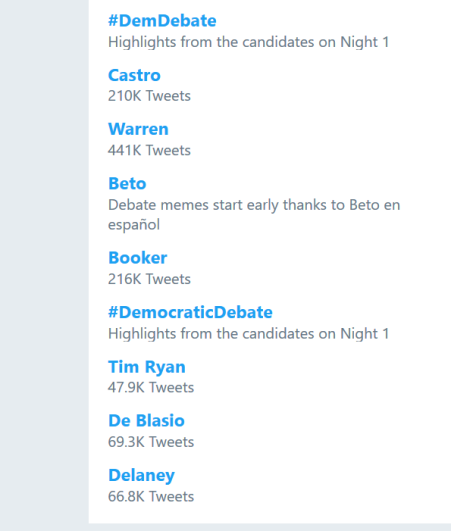
She was a big Google Trend too. Warren comes across as detailed and a good debater. She was less dominant in the second half of the debate, but a lot of people might not have made it that far. No one dented her car, so to speak. Biden and Sanders not being on stage might have helped her in a way because it made her seem like the one to beat.
Bill De Blasio: Winner
He went from a joke (those poll numbers…) to a guy who aggressively scored shots.
He’s used to handling the spotlight at this level, and it shows. He talked about his dad and his son in a moving way. Those on the far left may like his positions.
Tulsi Gabbard: Mixed
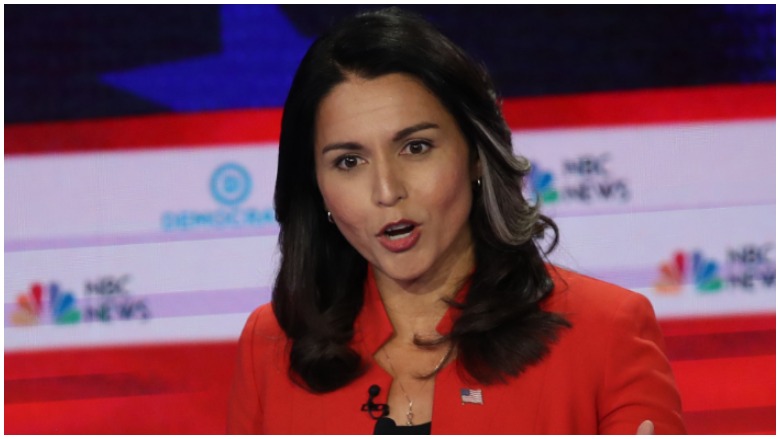
GettyRep. Tulsi Gabbard (D-HI) speaks during the first night of the Democratic presidential debate on June 26, 2019
Tulsi Gabbard, Representative from Hawaii, was Googled a lot, and her military experience makes her stand out. Some people think she got the best of Tim Ryan (but not Tim Ryan). However, people might have just been Googling that stray lock of white hair. If they learned why she keeps it that way, though, it’s pretty moving. “Natural. It happened after her deployment to Iraq. She keeps it as a daily reminder of her experience and her purpose,” her sister explained when people asked about the streak back in March.
She won a Drudge report post-debate poll, but that’s a conservative site.
Wrote one Twitter user, “Among my friends, the consensus is that Warren, Castro, and Booker were the most impressive. Beto struck some good notes, but was flat – he comes across much better at rallies and town halls than in this format. And the others? Tulsi was weird. The rest don’t really matter.”
Bernie Sanders?
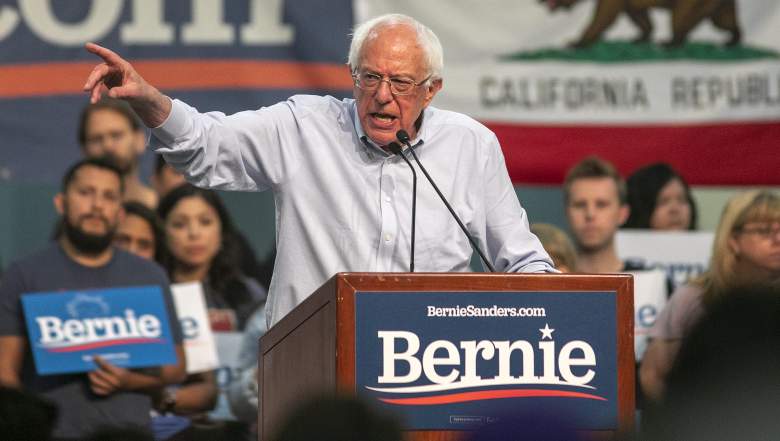
Getty
This Twitter user has a point: “It was obvious Bernie Sanders won the debate and wasn’t even on the stage. His agenda was front and center and dominated most of the discussion. As far the candidates on the stage, @BilldeBlasio was surprisingly very strong and moved the needle. Castro, Warren, Inslee as well.”
Whether that means Donald Trump was really the winner or loser of the debate (without being on stage) again is a matter of perspective.
